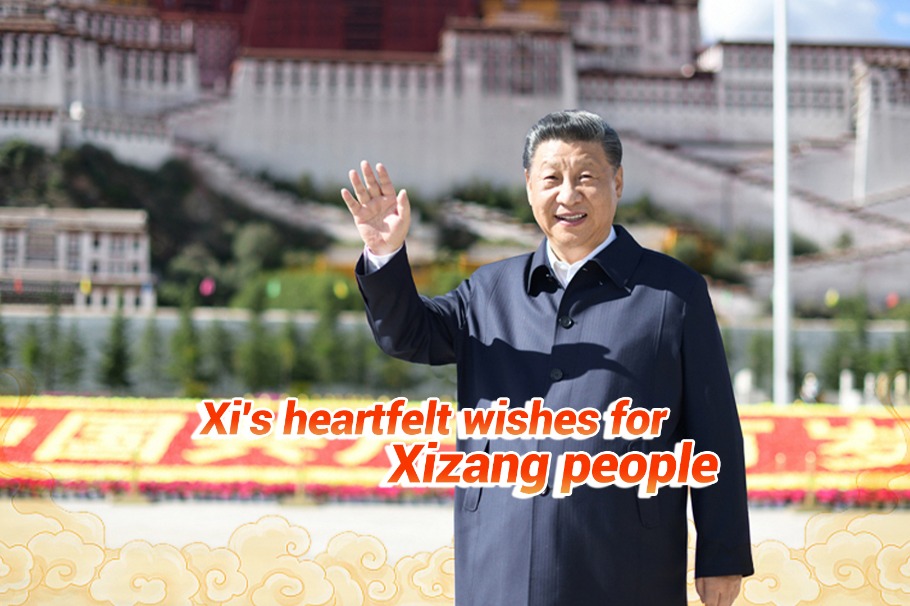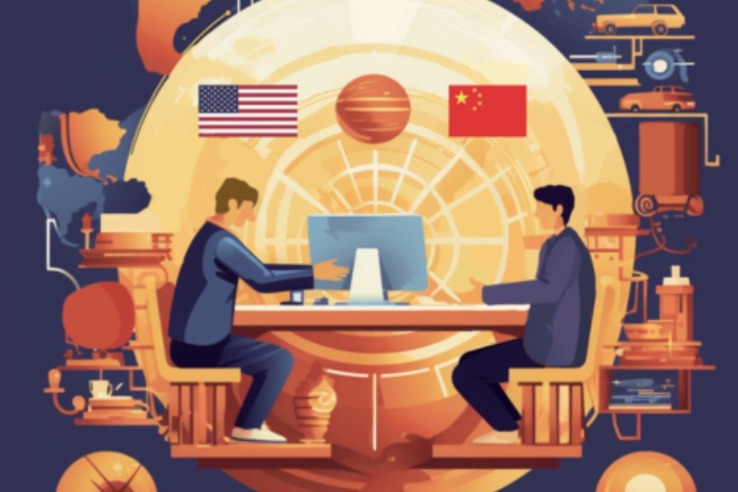Make it snappy
The on-demand economy is poised to play a greater role in stimulating consumption and expanding domestic demand


As China steps up efforts to boost consumption and expand domestic demand, e-commerce platforms are entering a new phase of competition driven by the rise of the "on-demand economy". This competition goes beyond the scramble for market share. It signals a deeper transformation in service models, powered by digital and intelligent technologies.
By meeting consumers' growing demands for speed and convenience, the on-demand economy, marked by instant retail and real-time services, has injected fresh momentum into consumption by creating new market opportunities, improving supply chain efficiency, and accelerating the digitization and intelligent upgrading of service sectors. With all the hallmarks of a fast-paced economy, it is also reshaping the foundations of market competition, shifting the focus from geography to time, from scale to efficiency, and from broad reach to operational depth.
The on-demand economy is a natural outcome of the digital and intelligent technology revolution. Innovations in big data, the internet of things and artificial intelligence have given rise to a consumption model centered on immediacy — real-time retail, fast logistics and digital payments. Consumers can now place orders on e-commerce platforms, receive their purchases within a short time, and complete transactions using smart devices, greatly enhancing the efficiency of service, logistics and payment systems.
The on-demand economy is reshaping consumption in three ways.
First, it effectively activates consumer potential. By meeting the demand for speed and convenience, the on-demand economy generates new areas of consumption growth by greatly expanding the scope of consumption and enhancing the consumer experience, and thus injects energy into the broader economy.
Second, it significantly improves service efficiency. From "takeout to home" to "everything to home", delivery time is now reduced from days to minutes, achieving a level of immediacy and convenience far beyond what traditional retail can offer.
Third, it drives the transformation of retail models. Platform-based and online tools enable merchants to break through the limitations of time and space and expand the reach of physical stores, thus revitalizing the vast network of small, locally based businesses.
While instant retail and services initially served niche, long-tail markets, their share has grown rapidly with the advancement of digital technologies. Meanwhile, younger generations, especially those born after 2000, have embraced fast-paced consumption as a lifestyle, further expanding the market.
Looking ahead, the on-demand economy is poised for further growth, fueled by ongoing advances in digital technologies. On the one hand, innovations such as drone delivery, Beidou navigation and smart robotics will enable point-to-point retail connectivity and support the growth of new business models such as direct e-commerce supply and unmanned retail. On the other hand, deeper integration of materials, smoother coordination across supply chain links, and greater supply chain intelligence will significantly enhance the efficiency of supply systems throughout the economy.
Last year's Central Economic Work Conference stressed the need to boost consumption, improve investment efficiency and the expansion of domestic demand on all fronts. The 2025 Government Work Report called for addressing inadequate domestic demand, particularly insufficient consumption, and making domestic demand the main engine and anchor of economic growth.
As a new consumption model driven by e-commerce platforms, the on-demand economy provides a wider range of consumption scenarios and greater room for innovation. It creates new avenues for growth and serves as an important channel for boosting consumption and expanding domestic demand. But to ensure its high-quality development, well-targeted policy guidance is essential.
First, it is essential to promote healthy competition among e-commerce platforms. The rapid rise of the on-demand economy has also brought challenges, particularly unhealthy, excessive competition. Addressing these issues requires stronger governance. The goal is not to suppress competition, but to guide it toward higher-quality outcomes, shifting from zero-sum rivalry to win-win dynamics driven by technological innovation, improved quality and a healthier industrial ecosystem.
Second, support should be provided to businesses so they can advance technological innovation. Platform operators, especially market leaders, need to be empowered to take the lead in innovation, including frontier technologies, integrated innovation, business incubation, industry guidance, scenario innovation and ecosystem building. Innovation should be harnessed to increase the supply of high-quality products and services, strengthen core competitiveness, and foster differentiated competition.
Third, regulatory governance should be balanced and inclusive. The revised Anti-Monopoly Law and Anti-Unfair Competition Law must be implemented effectively. Boundaries must be clearly defined to safeguard fair competition and curb emerging forms of behaviors that eliminate or constrain competition.
Fourth, industry associations should take on a bigger role in promoting self-governance within the sector. They should develop standards to guide product and service upgrades and protect consumer rights. At the same time, the principle of "technology for good" should be upheld, ensuring that platforms operate with prudence and full compliance.
Beyond its short-term boost to consumption, the on-demand economy will play a sustained role in driving the transformation and upgrading of China's service sector. While manufacturing is nearing its limits in terms of market capacity, the service sector, with vast untapped potential, is set to play an increasingly prominent role in China's economy.
In 2024, services accounted for 46.1 percent of total per capita consumer spending in China. During the upcoming 15th Five-Year Plan period (2026-30), this share is expected to exceed 50 percent nationwide, and significantly higher in major cities. As an emerging consumption model, the on-demand economy holds broad and promising growth prospects.
Therefore, China should strengthen top-level design and refine relevant policies to support the growth of the on-demand economy. Digital technologies such as big data, cloud computing and AI should be harnessed to drive new business models and formats, create fresh consumption scenarios, as well as expand and upgrade emerging forms of consumption.
The author is vice-chairman of the China Center for International Economic Exchanges. The author contributed this article to China Watch, a think tank powered by China Daily.
The views do not necessarily reflect those of China Daily.

































